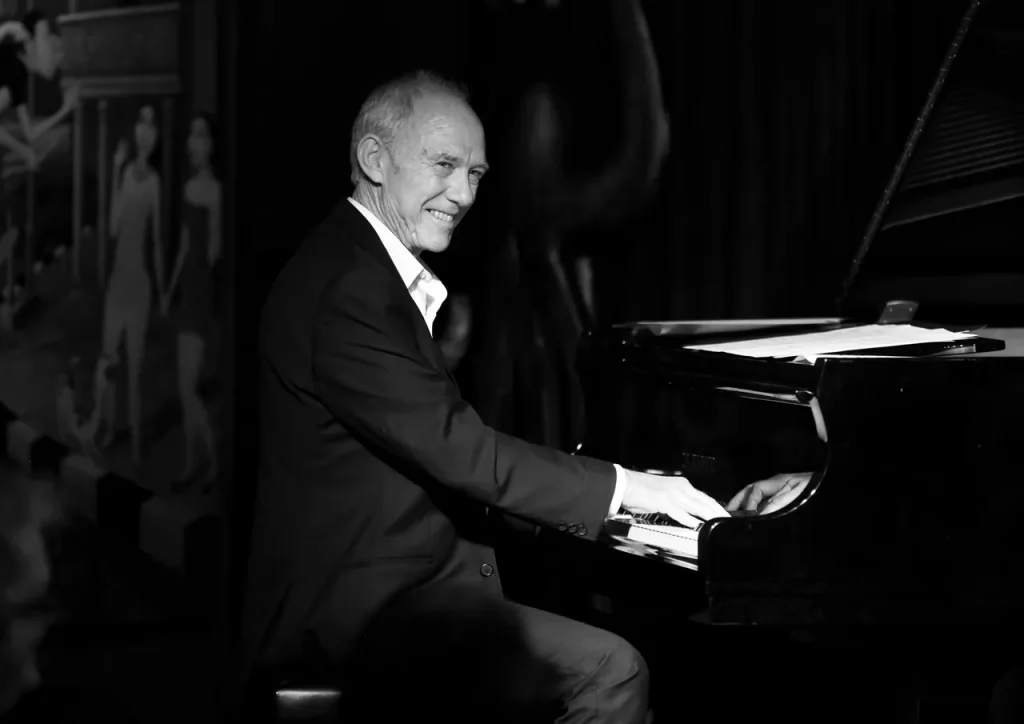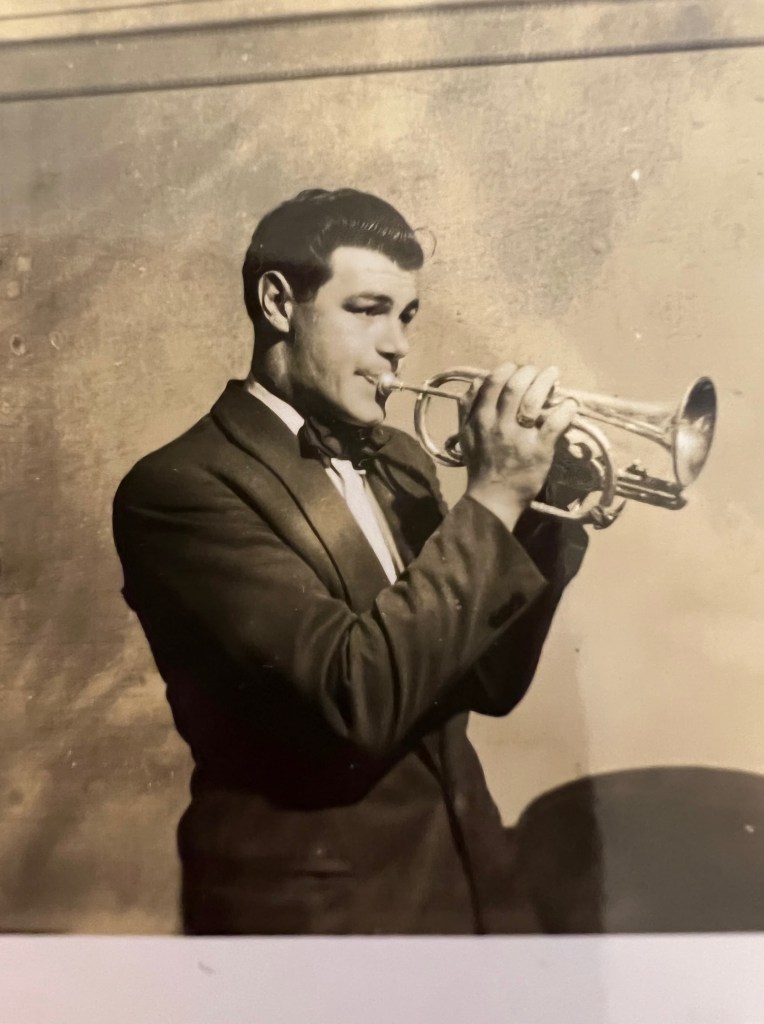by Peter Locke
Jazz legend Bob Barnard passed away in May this year after an extraordinary seven decades on the Australian and international jazz scene. In the last decade of his professional life, his regular pianist was Peter Locke, who’s taken the time to share some of reflections on the man and his influence.

I was a teenager in secondary school in Port Macquarie. After school, I was doing an apprenticeship, and it was during that time, that I heard Bob Barnard for the first time (on ABC radio). It grabbed me immediately. Bob was a regular on Eric Child’s program, and also Ian Neil’s show ‘Music to Midnight’.

Soon I moved to Newcastle, knowing I wanted to do something in music, although I knew not what! But I was eventually lucky enough to be in a band with a very young (18-year-old) Warwick Alder and Martin Hill, and later also the renowned Dave Van Kreidt from the US (formerly with the Brubeck octet, Stan Kenton, and others); and I also did gigs with the sweet-playing, talented trumpeter Bob Henderson who would go on to play with the legendary Graeme Bell (with whom Bob Barnard played during the 1960s). Through those years I was becoming more and more aware of Bob Barnard and his music, and I first heard him live at Belmont 16ft Sailing Club in Newcastle, with his magnificent sextet. One memorable recording I heard around that time was on radio and it was ‘The Song is You’ with Tony Gould at the piano — once again, something special!

When I moved to Sydney I studied with piano master Chuck Yates, which really set me up on the right path to becoming the player I aspired to be. I use these lessons every time I play and am indebted to Chuck for this. From there, I did many and varied gigs, including the ‘Fugitives Show Band’, which featured four-part vocals, then club work, including with Stan Wilson’s Orchestra at Bankstown Sports Club. (There was still a lot of live work for musicians at that time.)
Following Stan, who was a regular in the Channel 9 orchestra (I think), I did almost ten years of solo piano work. One gig I had was playing a sort of cocktail piano in dining rooms, including seven years at City Tatersall’s Club. I was handed this gig by the late Vince Genova and have always been grateful to Vince for that. There were a diminishing number of these types of rooms left in Sydney where it was simply the solo piano, with no vocals. All the while, I was listening to the very best of Sydney’s world-class musicians, and hoping to be among them one day.

Then one day the solo gigs all finally finished and I was suddenly a freelance pianist. I had to make my way back to the jazz world, to the music I actually needed to play. My first piece of luck came when the late Janet Seidel called me to see if I’d fill in with Brad Child’s big band at the Soup Plus restaurant in George Street, Sydney. Janet at that time was working six to seven nights a week! I’d heard Brad’s orchestra when I dropped in after solo gigs on a harbour cruise show. I loved the band immediately due to Brad’s ‘no microphone, no amp’ policy. (This was to preserve the natural sound of the instruments, and everything was natural volume.) I’d listened a lot to that artform through my teens — all the big bands and the players in it. Here was an orchestra with that natural sweet (and hot) sound. The band gave me a chance to meet so many players including many of the younger players I didn’t yet know. Monday nights there were always a high, particularly when you had the A-class rhythm section and the top soloists in town: Dave Seidel on bass, Andrew Dickeson on drums, Dan Barnett on trombone, Peter Cross on trumpet, Paul Furniss on tenor/clarinet, Brad Child himself, and many more. I never drove home after that gig without feeling on top of the world.
Being in the band led to more gigs being offered, and I was feeling better about the world. Then, some time after, with the sad loss in 2005 of Chris Taperell, Bob Barnard’s pianist of many years (and a master in the genre himself, a guy I admired greatly, both musically and personally), I found myself, almost by default if you will, suddenly in Bob Barnard’s quartet and sometimes his larger ensembles. It was joyous but intimidating at the same time. I’ll admit I was initially quite nervous and took a while to settle in and allow those lessons I mentioned to prevail. And so began a sharp learning curve.

Bob Barnard knew more songs than anyone I ever met in music, spanning so many different eras. Right from early King Oliver, Louis, Jelly Roll Morton and so on, up to songs such as ‘The Song is You’, ‘Yesterdays’, and some exotic things such like ‘Borsalino’, ‘The Windmills of Your Mind’, even ‘Take Me Out to the Ball Game’. Bob had always had such great players with him over the years, including John McCarthy, Paul Furniss, John Costelloe, Chris Taperell, and Lawrie Thompson, all great artists themselves.

But also it was Bob’s demeanour on stage which helped me enormously, as there was never any heat going on. You knew he expected everything to happen, everything to be covered as it were, but it was for you to work it out. And so I got to thinking about the music and the songs, and working it all out. I’m still not happy with the number of songs I’ve learnt and I’m still studying this. It goes on for the rest of an artist’s life, which is a great thing of course.

Among the memorable gigs, including a birthday gig in Dubai, I remember going to Victoria with Bob and his wife Danielle to do a concert at, I think, the Bentleigh Club in Melbourne. This followed the recording of an album of the songs of Willard Robeson on which Bob’s niece Rebecca Barnard (Len Barnard’s daughter), sang some really nice tracks. Rebecca, by the way, is also a very talented comedienne (a chip off the old block!). Somehow we ended up running late and we entered the hall to stupendous applause just in time to get on stage and start. I remember it was James Clarke on bass. It was the usual thing, Bob would call a song — by memory it was ‘I Never Knew’. I’d not played the song much and not for a long time, so I was quickly deciphering the song in my mind as we were counted in, including the often-used key change in the bridge, and we were away.
The band was hot from the downbeat. I must say, whether it was the tight start, or that Bob was originally from Melbourne (or both), but Bob was firing that night like I’d never heard him! I’ll never forget it. It was, once again, something extraordinary.
I tried to stay with the artistry going on — where everything Bob played was really, you could say, a melody of its own. The way he would weave the notes through the harmonics of a song somehow keeping the integrity of both melody relevance and the critically important harmonic notes, was something to marvel at.
The better the rhythm section became, the better Bob would be playing. I always felt he had more gear changes up his sleeve than what certainly I could give him. However, the quartet did some wonderful gigs with many high artistic moments. I was fortunate indeed to be in Bob Barnard’s Quartet for probably the last ten years of his playing career.
May we all continue to marvel at that special sound and artistry he has left us.



